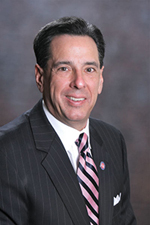 |
| Ted Okon, executive director of Community Oncology Alliance |
Cancer drug spending has drawn the ire of payers, patients and doctors unhappy with skyrocketing costs for the meds. Now another voice is joining the chorus of naysayers, as a new report from a cancer community nonprofit organization found that a government discount drug program is profiting off the rising costs of cancer meds.
Cancer drugs have become "the pot of gold at the end of the rainbow" for hospitals and clinics participating in Medicare/Medicaid's 340B program, Ted Okon, executive director of Community Oncology Alliance (COA), told The American Journal of Managed Care. Even though 340B was originally intended to reduce costs for uninsured or underinsured patients, things haven't shaken out that way.
COA, an oft vocal critic of 340B, looked at Medicare Part B hospital outpatient spending for institutions participating in the program and saw striking differences in spending for cancer drugs over three years. Medicare Part B reimbursement for cancer drugs for 340B clinics and hospitals shot up 123% between 2010 and 2013, compared with a 31% increase for hospitals not participating in the program. Cancer drug spending dropped by 5% in community oncology practices during the same period, according to data cited by the AJMC, suggesting a growing disparity between 340B and community health institutions.
Spending on cancer drugs has actually become a business strategy for 340B institutions, Okon said. Hospitals participating in the program want to buy up independent oncology practices to increase their profits. And the independent practices often can't compete, forcing them to join hospitals or pack up camp.
Plus, an expanded pool of providers buying discounted drugs means the rebates will have to be incorporated into the med's overall price--an all-too-familiar phenomenon in current cancer drug pricing. "Already, 340B expansion has had unintended consequences," Okon said, as quoted by the AJMC. "Anyone who doesn't think all these rebates are not fueling drug prices is not paying attention."
The findings echo a July report by the Government Accountability Office (GAO), which also found that the 340B program created unfair incentives for hospitals to prescribe pricier cancer drugs in greater quantities. And patients could soon feel the burn, as Medicare Part B beneficiaries have a 20% copay that will continue to increase alongside drug prices, the AJMC article points out.
"While it is not unlawful for hospitals to benefit from the drug discount program," the practices "are not consistent with the legislative intent," the GAO said in its report, as quoted by the AJMC.
- read the AJMC article
Special Report: Top 10 best-selling cancer drugs of 2013